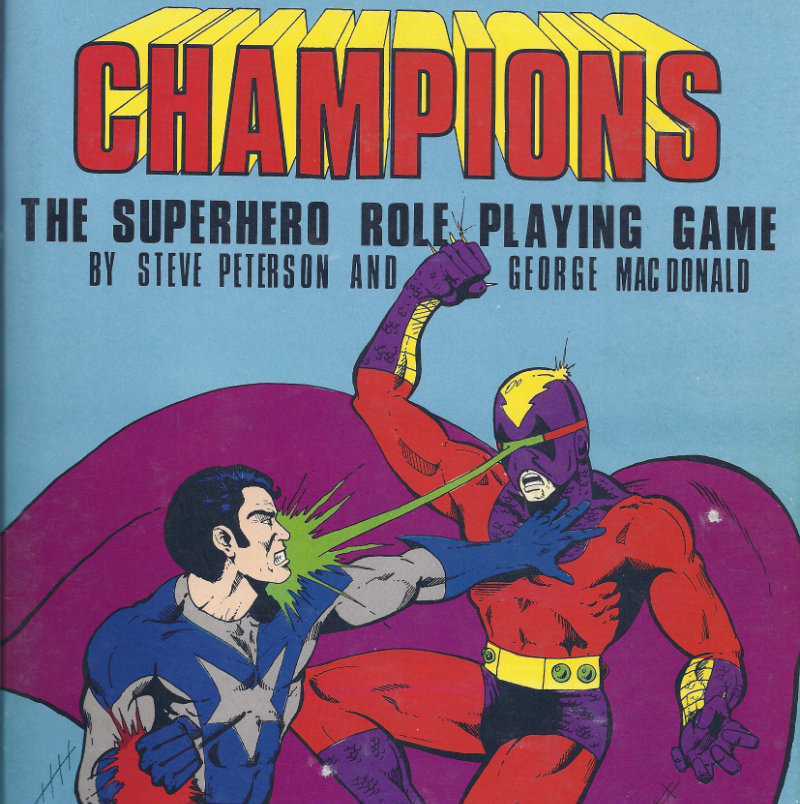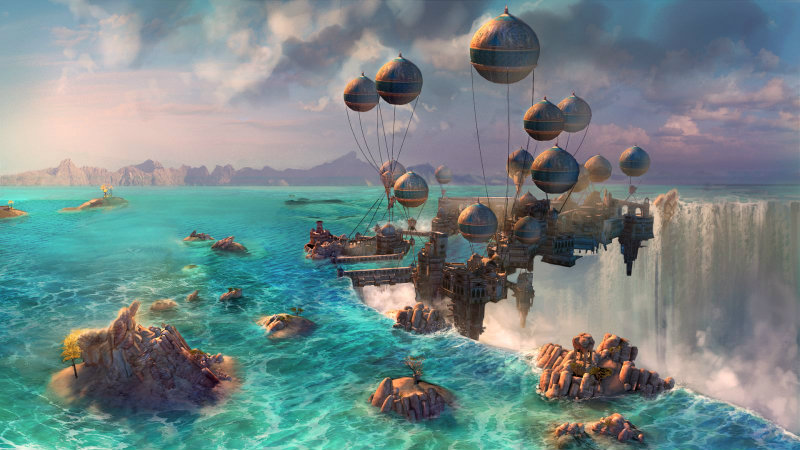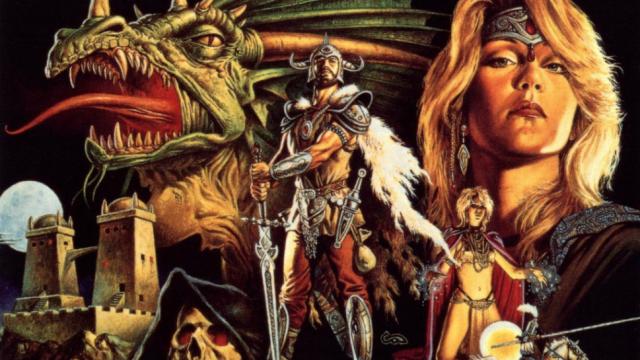The best role playing game campaigns create stories you’ll be telling around the gaming table decades later. But what’s that magic ingredient that takes a game from great to once-in-a-lifetime? We talked to gamers, game designers, and authors to find out what makes a campaign truly memorable.
One thing stood out among the various tales of campaigns past: the incredible diversity of games being played. Basic sword & sorcery RPGs were actually in the minority. Beyond that, it seems as if a truly memorable campaign is a strange alchemical brew of many different factors stirred together.
Great Players
“Like great teams in sports and business endeavours, if there’s a chemistry among the participants and they truly enjoy fellowship together, everybody wants to be there, stay involved, and just have fun together,” said Ed Greenwood, creator of the Forgotten Realms and author of numerous fantasy novels.
Bill Cavalier, the infamous Dungeon Bastard, was even more direct:
You can’t have a great game without great players. I don’t care how good of a DM you are, if your players are turds your campaign stinks. Great players know how to step up to the scenario laid before them and act heroically. Maybe that’s self-sacrifice. Maybe that’s kicking righteous arse. Maybe that’s just sitting back and putting the puzzle pieces together no one else has thought much about. There are different ways to be a hero.
An RPG is a game of collaborative storytelling, so it’s no surprise that the success of a campaign depends on the players as much as it does the GM. RPG veteran Monte Cook (D&D 3rd Edition, Numenera), drove home the importance of character-driven stories:
I think that, to a large extent, the players matter more than anything else. To have a great campaign, you need a great GM who’s got some wonderful ideas, but you also need players who are willing to invest themselves in their characters and make those characters a part of the setting that the GM has put before them…In one D&D 3E campaign I ran set in my setting of Ptolus, there was one player (now Paizo publisher Erik Mona) who created a character who was a pompous jerk. Erik was savvy enough to play this character in such a way that while the other characters all hated this jerk, the players all loved him…Erik made the jerk entertaining to watch (and often get taken down a few pegs). Plus, he invested his character in the story. This meant his pompous jerk got punched in the face a few times (sometimes by other PCs) and Erik recognised from the point of view of the story and the campaign, his character completely deserved it.
“I think the thing that makes a campaign memorable, more than anything else, is the willingness of the players to just bring their ‘A’ game,” said Adam Koebel, co-designer of the Dungeon World RPG:
It doesn’t have to mean big serious intense roleplaying — I’m having an amazing time these days playing in a weekly Dungeon Crawl Classics game that’s probably 80 per cent bullshit and 20 per cent gameplay and it’s as meaningful to me as any game of Apocalypse World or Fiasco I ever played. I think that if you build on a foundation of players who are all in it to engage with the mechanics, are fans of each other and share the spotlight and who are willing to do what it takes to see the thing you’re all working on together through, you can make an amazing experience out of a roleplaying game. Everything else will flow from that – memorable scenes, powerful characters, building the narrative together.
David F. Chapman, designer of Doctor Who: Adventures in Time and Space and the Vortex System RPGs, ran a campaign almost entirely off of the interactions between the players and characters:
The most memorable campaign for me has to be the game of Mage: The Ascension I’d been running. There didn’t seem to be any definite plot that I’d created — it was one of those beautiful moments in RPGing when the players had created characters with such great personalities and backgrounds that the game almost created itself. They were a bunch of goths living in an old house in Highgate, London. They came into contact with a few interfering vampires and had some run-ins with the Technocracy, but most of the time it was just freeform. The characters would do their own thing and I’d feed off of that and it would gradually build each session into some pretty intense drama.
Gareth Ryder-Hanhrahan summed up the importance of players to a campaign when I asked him what the most vital element is:
Player agency and enthusiasm. A good campaign can hit this critical mass of plot, where the players are building their own schemes on top of earlier events, and the whole game comes alive. It’s that drive arising from past history that distinguishes a campaign from a series of adventures.
Great Friends
On the other hand, with the right group the game ends up not mattering that much at all. My own gaming group tends to sit around shooting the breeze for the better part of an hour before we get down to actually playing anything. We’ve certainly had some memorable campaigns over the years, but I remember time just hanging out with friends as much as the details of our adventures.
Editor and web designer Manda Collis said:
I think that good stories and events absolutely make good campaigns, but a lot of it is who you’re playing with and just the camaraderie between friends. I’m currently in a really fantastic Vampire: the Requiem game with some good friends and it’s one I won’t forget anytime soon because we’re having such a great time. The characters and story are interesting too, but the story is just made so much greater by who we’re playing with.
Author Sheryl Nantus emphasised the need to have fun and infuse that into your characters:
You need people who like to have fun, who love to go down the road not known. One friend my hubby and I played with loved to have ‘imaginary battles’ while we were out of sight and then regale us with his battles that we knew were totally false. Suddenly one imp became a thousand and they all dragged off the bodies, leaving only one for us to actually see.
Get Weird and Ambitious
I asked writer and editor Wade Rockett what advice he would offer to GMs who want to create a memorable campaign.
He said:
Collaborate with your players. In fact, I suggest planning the campaign with your players so they understand what you want to run, and you understand what they want to play. They can also give you good ideas, or run in unexpected directions with one of your ideas. With my current 13th Age campaign, I told my players the setting I had in mind — a gloomy, haunted frontier province that’s probably doomed to be overrun by orcs or demons someday. During character generation, they offered up enough story hooks that I now have no shortage of adventure ideas.
Some of the most memorable campaigns push the boundaries of what is possible in an RPG. It might be a weird blend of genres, or a sprawling, ambitious campaign that has world-spanning implications and involves politics, war and magical intrigue.

“My most memorable campaign was a shared-world Champions superhero campaign we called ‘the Big Board,’” said Rockett. He continued:
It was run by four GMs and lasted several years. First, we met to establish the basics of the setting and divvy up responsibilities. Each of us took a geographic region of the U.S. and an element of comic-book reality: organised crime, magic and the occult, government and espionage, and the overarching framework for how superheroes operated in our world. There was a loosely-organised group called Nexus with a central location in the Midwest, and franchises across the country. Characters and storylines would cross over, and we’d borrow each others’ villains.
Adam Chmelka told me this tale of a campaign that went against the grain:
When the party got wiped out in a published campaign I was running, I let the players pick up the story as a team of evil necromancers, hired by the bad guys to capitalise on the previous party’s failure. Eventually the group (affectionately nicknamed ‘Team Necro’) were hailed as saviors of the city, all while covertly using it as a base for their own nasty plans. Evil parties have a reputation for self-destructing, but the players were able to keep from messing with each other, in favour of working together against the rest of the world. They got to feel like badass, rule-breaking villains, while I was still able to use 95 per cent of the campaign as I would have for more heroic characters.

Quite often you don’t plan for a campaign to go off in a weird direction, but it does. Sometimes you have to roll with it, grab the weirdness by the tail, and see where it leads. “In my experience, memorable campaigns are magical things — the confluence of a wide range of elements that come together at the same table at the same time,” author and editor Shanna Germain told me. She added:
For me, those include interesting, flexible players, an engaged GM, high stakes, an exciting adventure, and the Unexpected. Most of those seem obvious, but the Unexpected, I think, is one that often gets overlooked or is perhaps the hardest to nail down. It’s the moment of surprise, that point that no one saw coming and that changes the energy completely around the table. Sometimes this is planned by the GM ahead of time, other times it just happens naturally out of the progression of events and the character interactions. If you think back to your favourite campaigns, it probably had one of these moments: either everything went suddenly wrong and you overcame it, or some bizarre solution worked but had unexpected results, or the entire table started cracking up over something silly and it became integrated into the entire campaign.
Longtime gamer Martin Nantus offered this simple advice to GMs: “Don’t be afraid to try something crazy! The less someone expects it (and sometimes that’s the DM) the more fun it can turn out to be.”
Raise the Stakes
“A campaign really becomes memorable when the players care about characters in the setting, a place, or a cause (or all of those, and more),” said Greenwood. “When who and what things happen to becomes meaningful, then what happens starts to matter, and play can evoke strong emotions, fierce and ongoing urges to succeed, and a desire to leave a mark, drive meaningful change, or build lasting institutions.”
Of course, the stakes are always high when you’re gaming with the Dungeon Bastard:
A memorable campaign transcends the normal adventure-level goals of kill stuff, gain treasure, get XP. There’s an aspect of trying to achieve the impossible: kill a demon lord, defeat the lich-king, destroy the evil artifact. This is fantasy role-playing at its richest. Characters can begin with loveable traits, but it’s their heroic deeds and bruising trials together which contribute to a truly legendary campaign.
Gamer David Rogers raised an interesting point — you can’t just tell the players the stakes are high. You have to let them have an impact on the story and the world. He said:
I believe the thing that really makes great games are stories that players can tell about things they did. There were some NPCs in my Lady Blackbird game that I really loved, but I generally found they were memorable in proportion to the affect the players had on them. So the foppish nobleman one character persuaded to go on a quest to recover his lost love was beloved; the all-knowing Yoda-ish sky pilot who didn’t do much but dispense exposition was boring. The vicious princess who got in over her head was a much-hated villain, but the brilliant pirate king who was always a step ahead fell flat. Likewise, the best plot twists were the ones that were suggested to me by questions the players had, not reveals I came up with on my own.
“What made [my favourite campaign] stand out is that even though it was a home-brew world I was impressed with the detail that was put into it,” said Martin Nantus. “You could say the love that my DM had for the world shone through. Even after I started devouring manuals and other campaign worlds (Greyhawk, Dragonlance, Forgotten Realms) I always thought the work he did on it was somehow…more honest I guess.”
Great Moments
Whenever anyone told me about their favourite campaign, they inevitably described some specific moments that stood out. No campaign is complete without the astounding, absurd, or awe-inspiring events that emergent storytelling can produce. Martin Nantus once pole-vaulted over a Tarraque. Shanna Germain told me about a friendly alien whose inept attempts to keep everyone quiet lead to a terrifying fairy tale told to the children of Numenera. ed Greenwood’s players became the Knights of Myth Drannor (although it took them decades to do it). Sheryl nantus played in a Toon campaign as CD player that could only play Barry Manilow CDs. David Chapman had a longtime character die and return as a wraith even as the other characters mourned the loss of a friend.
In the end, the things that make a campaign great are the things that make us love tabletop RPGs in the first place. Adam Koebel summed it up:
Like any human endeavour, love makes a campaign come alive. You want your game to live in the back of your brain, burrowing into your thoughts. You want to hear a song on the radio and have the lyrics inspire an encounter. You want to watch a movie and steal characters for the next town the players will visit. Love your campaign. Love it so hard, and share that love with your players…A good campaign is the fruit of a collection of fertile minds — culture and experience will feed your brain and make your campaigns really sing.

Comments
12 responses to “What Was The Most Memorable Game You Ever Played?”
Bungie’s Marathon
Suikoden 2. 20 years of it and still beat it at least once a year.
Fantastic game although Suikoden 1 will always be my favourite of the two because I played it first.
Demolition Man pinball machine. 18yrs old on a RAAF base in the middle of nowhere it was literally the only gaming I had for an 18 month stint.
The Dig.
Mad Doctor on the C64. I still have fond memories of cutting up bodies and building my own Frankenstein.
The original xcom. First game I ever had or played on the first computer we had at home. Would’ve been 8-9 at the time. Still play it every year and I’m 30. Love it!!
Wipeout 2097 tied with FF7.
Metal Gear Solid on PS1.
I’m not really sure why this article is almost purely focusing on RPGs…like campaigns of other genres can’t be memorable or something.
Like for me, Metroid Prime would be right up there, as would Donkey Kong Country 2, Starcraft + Brood War and Quake. Of course there are some RPGs in there too, like Secret of Mana and Final Fantasy VII. But I dunno why this article is limiting the selection. The title says “game” but primarily discusses RPGs.
The article is specifically, entirely, and unapologetically about tabletop role-playing games. It is not about video games even a little, and I don’t think it’s surprising that it does not discuss non-tabletop, non-RPG video games. I think we should be more surprised that we see the word “game” and automatically reduce it to a very specific type of game that is not the author’s intent. Most if not all of the comments are by people who either did not read the article or read it and opted to ignore it and have an unrelated discussion.
But as long as we’re talking about non-tabletop, non-RPG games that are also memorable, I posit the 1958 NFL Championship Game for how it changed the meta of sporting.
For me the most memorable game would be Uncharted Waters. It was open world from the get go. Start with a ship, some gold, quartz and your father’s old ship mate, the whole world at your fingertips.
Might and Magic 5 – Darkside of Xeen. First played this in a PC shop back in the very early nineties. The game just blew me away. Was even more fun once I got to play it. Had never seen anything like it. Been a huge fan of the series + Western RPGs ever since.